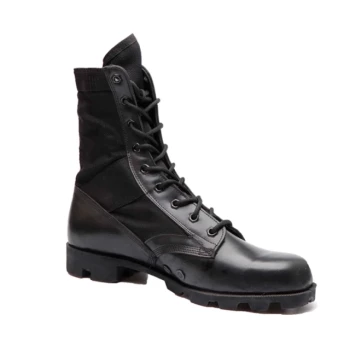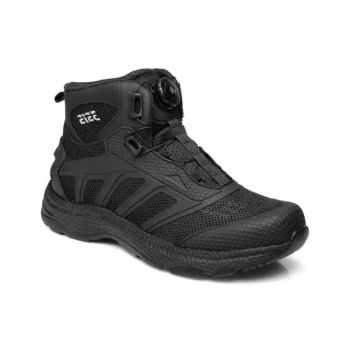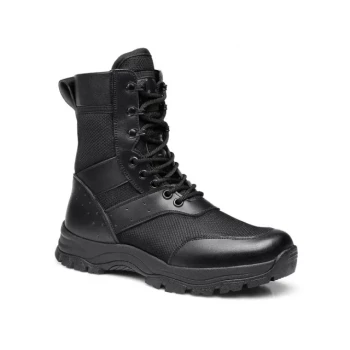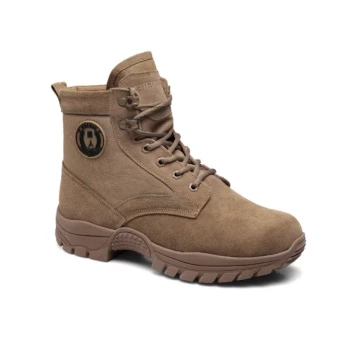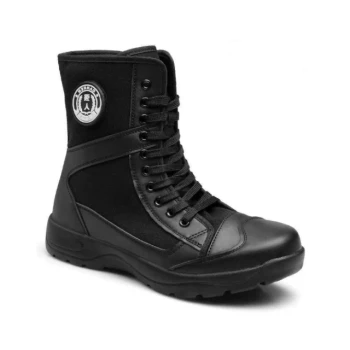To ensure a comprehensive evaluation, the wellington boots were subjected to a long-term testing process that spanned several months. This involved using them in a variety of real-world conditions, including both active gardening and general walking. The review was based on four equally important criteria: comfort, the quality of the sole and materials, overall durability, and value for money.
The core of this testing methodology was to move beyond a simple "out-of-the-box" impression. Instead, it focused on simulating genuine, long-term ownership to assess how the boots perform, wear, and feel over time in their intended environments.
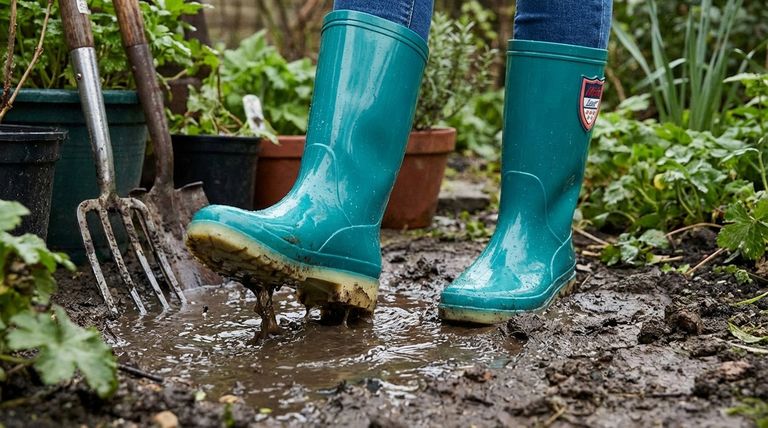
A Breakdown of the Testing Criteria
The review's credibility rests on its structured approach to evaluation. By giving equal weight to four key areas, the test provides a balanced view of a boot's performance, rather than focusing on a single feature.
Gauging Long-Term Comfort
Comfort was assessed during prolonged periods of use, not just the initial fit. This answers crucial questions about whether the boot rubs, provides adequate foot support during tasks like digging, and remains comfortable after hours of wear.
Inspecting the Sole and Materials
The sole is critical for both safety and function. Testers evaluated its grip on various surfaces and its flexibility during movement. The quality of the boot's primary materials was also inspected for pliability and resistance to premature cracking.
Assessing Real-World Durability
This is arguably the most important long-term metric. By testing over several months, the review could identify potential weak points, such as seams splitting, leaks developing, or the tread wearing down excessively. This separates boots that last from those that fail after one season.
Determining True Value for Money
Value is not simply the price tag. This criterion measures the boot's purchase price against its performance in comfort, materials, and durability. An inexpensive boot that fails quickly offers poor value, while a more expensive, long-lasting boot may represent a much better investment.
Understanding the Trade-offs
No wellington boot is perfect for every situation. The testing process implicitly highlights the inherent compromises in their design, which are crucial for any potential buyer to understand.
Waterproofing vs. Breathability
The primary benefit of a wellington boot is that it is fully waterproof. The unavoidable downside is a lack of breathability, which can lead to discomfort and sweaty feet in warmer weather.
The Importance of Proper Fit
A boot's effectiveness is highly dependent on its fit. If a boot is too loose, water can easily splash in from the top during heavy rain or when walking through deep puddles, defeating its primary purpose.
Protection vs. Flexibility
Full-length wellingtons offer maximum protection from water and mud. However, this length can sometimes feel restrictive during activities that require more ankle flexibility, presenting a trade-off between coverage and mobility.
Making the Right Choice for Your Needs
By understanding how these boots were tested, you can better interpret the results and align them with your own priorities.
- If your primary focus is occasional gardening or light walks: Prioritize comfort and overall value, as extreme durability for daily, heavy-duty use may be less critical.
- If your primary focus is daily, demanding work on rough terrain: Emphasize durability and the quality of the sole and materials above all else to ensure a lasting and safe investment.
This testing framework empowers you to look past marketing and focus on the performance metrics that truly matter for your specific use case.
Summary Table:
| Testing Criteria | Key Focus Areas |
|---|---|
| Comfort | Long-term wear, foot support, absence of rubbing |
| Sole & Materials | Grip, flexibility, material pliability, crack resistance |
| Durability | Seam integrity, leak resistance, tread wear over months |
| Value for Money | Price vs. long-term performance in all other criteria |
Need Durable, High-Performance Wellington Boots for Your Business?
As a large-scale manufacturer, 3515 produces a comprehensive range of footwear for distributors, brand owners, and bulk clients. Our production capabilities encompass all types of durable and comfortable shoes and boots, designed to meet the rigorous demands highlighted in this review.
We can help you:
- Source or customize wellington boots that excel in long-term comfort, material quality, and durability.
- Ensure your products deliver superior value to your customers, building brand loyalty.
- Benefit from our large-scale manufacturing expertise to get high-quality footwear at competitive prices.
Let's discuss your specific needs. Contact our team today to explore how we can support your business with reliable footwear solutions.
Visual Guide
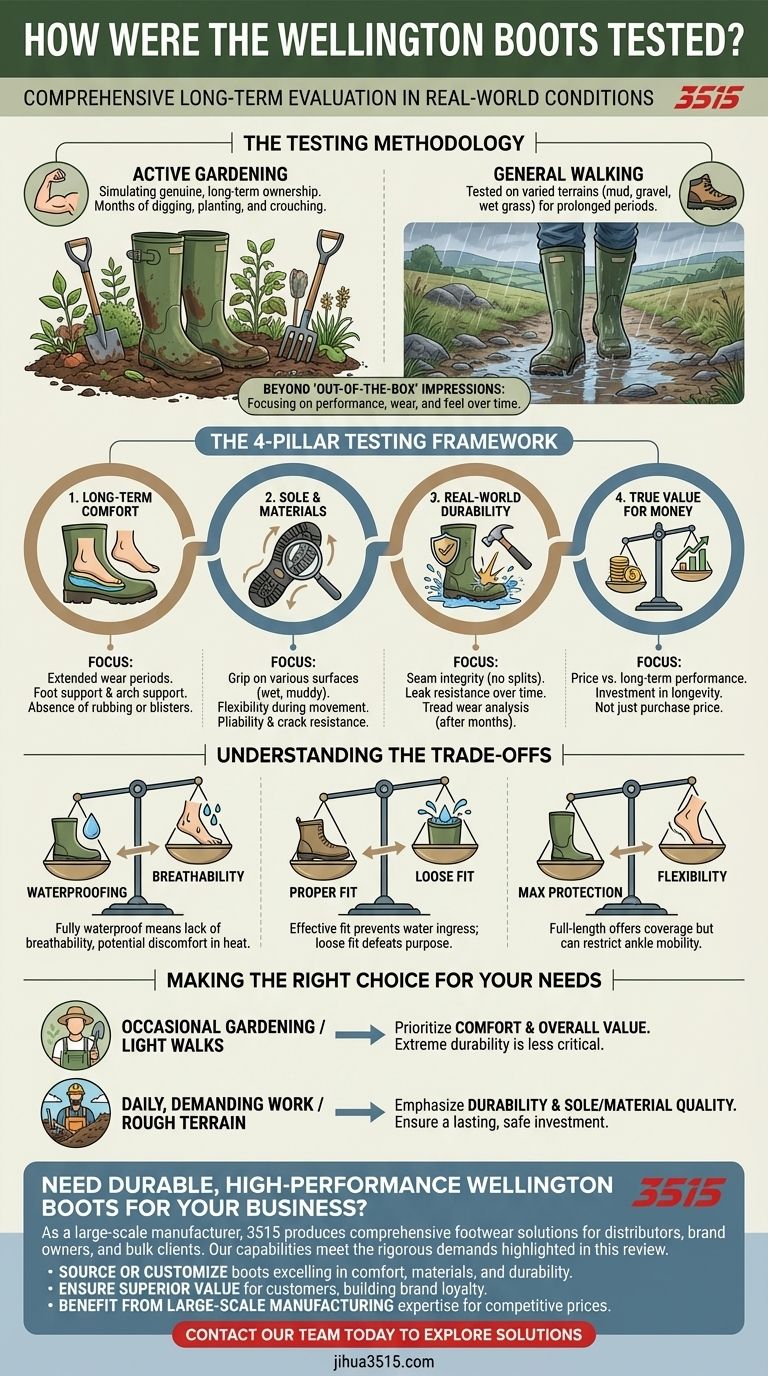
Related Products
- Factory Direct Wholesale Rain Boots Durable Waterproof & Fully Customizable
- Safety Footwear Wholesale Manufacturer for Custom OEM/ODM Production
- Factory-Direct Wholesale Canvas Boots with High-Traction Rubber Soles
- Premium Flame-Retardant Waterproof Safety Boots and Shoes
- High Performance Fire-Retardant Waterproof Safety Boots
People Also Ask
- What features should one look for in high-quality gardening boots? Ensure Dry, Comfortable Feet All Day
- What are the main materials used in the construction of half-boots? A Guide to Durability & Performance
- What are the recommended steps for cleaning rubber boots? A Guide to Extend Their Lifespan
- What materials are Wellington boots typically made from? Natural Rubber, PVC, or Neoprene?
- What are the traditional and modern uses of wellington boots? From Military to Mainstream
- What are the recommended materials for temporary or part-time workers needing waterproof boots? Find the Most Cost-Effective Choice
- What should be considered when choosing wellington boots regarding clothing? Ensure a Perfect Fit for Your Activity
- What are the common lengths of Wellington boots? A Guide to Maximum Protection vs. Everyday Convenience








